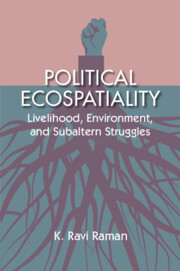Book contents
- Frontmatter
- Contents
- Acknowledgements
- 1 What Is Politics Proper? Why Political Ecospatiality Matters?
- 2 Birlas in Communist Kerala: Clash and Consensus as Subaltern Narratives
- 3 Occupy Muthanga: Land, Forest, and Reinventing Indigeneity and Identity
- 4 Dalits and the Global Cola: Water, Power, and Resistance
- 5 Politics, Epistemology, and Environmental Modernity: Anti-endosulfan as Ethical Practice?
- 6 Caste, Land, and the State: What If Chengara Took the Place of Muthanga?
- 7 Pombilai Orumai: Plantation Dalits, Intersectionality, and Power
- 8 Ecospatiality: Right-Making/State-Making
- Index
1 - What Is Politics Proper? Why Political Ecospatiality Matters?
Published online by Cambridge University Press: 31 August 2024
- Frontmatter
- Contents
- Acknowledgements
- 1 What Is Politics Proper? Why Political Ecospatiality Matters?
- 2 Birlas in Communist Kerala: Clash and Consensus as Subaltern Narratives
- 3 Occupy Muthanga: Land, Forest, and Reinventing Indigeneity and Identity
- 4 Dalits and the Global Cola: Water, Power, and Resistance
- 5 Politics, Epistemology, and Environmental Modernity: Anti-endosulfan as Ethical Practice?
- 6 Caste, Land, and the State: What If Chengara Took the Place of Muthanga?
- 7 Pombilai Orumai: Plantation Dalits, Intersectionality, and Power
- 8 Ecospatiality: Right-Making/State-Making
- Index
Summary
Much before the Western radical youth ‘invented’ Occupy politics of 2011 (Occupy Wall Street, Occupy St Paul) in the West, inspired largely by the Arab Spring, there were instances in the Global South where precarious workers and communities unleashed their agency with unpredictable outcomes. What Hardt and Negri (2012) attribute to Occupy politics – their imaginations, revolts, slogans, movements and insistence on democracy as characteristics of multitudes – was also relevant for the subaltern struggles in the Global South. It is remarkable how the multitudes, both in the West and in the Global South, though spatially and temporally distinct, declare historically evolved truths through imaginative interventions towards a more egalitarian way of living. In South Asia, they also practised it as social movement identity politics in a world where corporates, often with the support of the state, threatened their rights to the commons, including their traditional environmental rights to land and water resources, and their human right to a decent living,3 thus bearing wider connotations than the Western-style Occupy protests. Latin American and African resistance movements such as the Landless Workers Movement in Mexico and Zapatistas/Chiapas in Brazil, and those in Buen Vivir (Ecuador), Cochabamba (Bolivia), the Estallido Social (Social Uprising) in Chile, and Ongoni (Nigeria) share similar traits in the way they assert and attribute new meanings to land rights, autonomy, food, water, environmental sovereignty, and identity. As a critical complement to the earlier-mentioned literature, the present monograph examines the livelihood, environmental, and identity struggles of the marginalized with a focus on Kerala, the state known for its twin legacies: the communist experiments and social development.
More on Premises
The protests, struggles, and movements in the Global South challenging corporate capital and the state, and even the mainstream male-led trade unions, take the form of what I would refer to as ecospatial struggles, resulting in the conceptualization of political ecospatiality in which ‘eco’ represents the varying dimensions of critiques of economics and ecology/environment and ‘spatiality’, the power relations ingrained in the social body politic (see Raman 2020b; Peluso and Watts 2001; Wapner 1996; Lefebvre 2011; Massey 1994; Harvey 2000).
- Type
- Chapter
- Information
- Political EcospatialityLivelihood, Environment, and Subaltern Struggles in Kerala, pp. 1 - 30Publisher: Cambridge University PressPrint publication year: 2025

